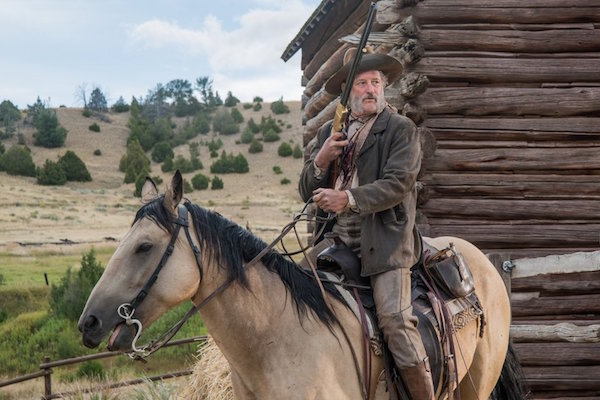
‘The Ballad of Lefty Brown’ is a retro western of revenge and frontier justice
By Diane Carson
Announcing lofty intentions in its opening, "The Ballad of Lefty Brown" begins with an onscreen quotation from Frederick Jackson Turner, influential historian of the American West. He wrote, "The frontier environment is at first too strong for the man. He must accept the conditions which it furnishes or perish." The character study that follows highlights that dichotomy: adapt or die.
The unforgiving milieu established, writer-director Jared Moshé's narrative will go on to explore archetypal western themes: loyalty, betrayal, revenge, and self-imposed justice. The pervasiveness of violence is launched immediately. To the soft strains of "Oh! Susannah," against a backdrop of thunder and nighttime rain, a gunshot rings out followed by muffled screams as a wounded man stumbles out of a saloon and collapses face down in the muddy street. Such is life in 1889, Red Bluff, Montana.
In short order, we'll meet Lefty Brown along with his friend Eddie Johnson. Showing his age, Lefty has ridden with Eddie for over forty of his sixty-three years. But, as gangsters, detectives, cowboys, soldiers and allies in all film genres assert, when your partner is viciously murdered, your sole mission is to avenge him. Lefty has his work cut out for him, navigating through difficulties with Johnson's wife Laura, U.S. Marshal Tom Harrah, new Montana Governor James Bierce, and the young, impressionable Jeremiah.
The cast is solid though unexceptional with too deliberate performances: Bill Pullman as Lefty Brown, Peter Fonda as Johnson, Kathy Baker as his wife Laura, Jim Caviezel as Governor Bierce, Tommy Flanagan as Marshal Harrah, and Diego Josef as Jeremiah. Cinematographer David McFarland provides an equal presence in the beautifully photographed Montana landscape that minimizes human presence. Terel Gibson's editing is excellent when scenes don't bog down in heavy-handed dialogue.
Channeling the reluctant hero persona, The Ballad of Lefty Brown doesn't so much break new ground as try to push the tropes. Predictably, Lefty serves as a mentor/father figure to Jeremiah, women are marginalized, and villains in shootouts most often have bad aim. But Moshé sets his story with the frontier being pushed on, though corruption arrives right on time and with reprehensible defense, i.e. nothing new there.
Fans of westerns will enjoy the tried and true conventions. I longed for something more edgy and insightful. At AMC's West Olive Cinema.


